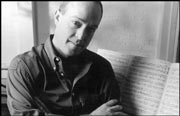DAVE DOUGLAS’ WITNESS
Sit & Spin, 441-9484, $12 9 p.m. Sun., Oct. 7
DAVE DOUGLAS couldn’t have picked a better time to get political. His latest project, Witness, is dedicated to, and inspired by, the life and writings of a half-dozen peace and justice activists around the world. Pretty good timing, as our inward-looking nation wakes up to the terrifying realities of the global village. One—perhaps the only—benefit of the recent horrors is they “make us all aware about what’s going on in the world,” says Douglas, “and that awareness is a positive thing.” As the name suggests, awareness is what Witness is all about.
“I’m not a lyricist,” notes the 37-year-old composer and bandleader, speaking by phone from Brooklyn. “I’m not writing folk songs like Joan Baez or Bob Dylan, a lot of our heroes.” Instead, he faces the challenge of conveying a political message through the abstract means of purely instrumental music. No one’s better equipped to do it. Known for his thoughtful trumpet work and boundary-pushing compositions, as well as his articulate intelligence off the bandstand, Douglas won a “triple crown” from Down Beat magazine’s critics’ poll last year for Jazz Artist, Jazz Album, and Trumpeter of the Year. To aid his message, though, he offers explanatory liner notes to the band’s new CD (Witness, on RCA Victor), recommending various books (The Greater Common Good by Arundhati Roy, e.g.) and Web sites (www.doctorswithoutborders.org) for listeners to further pursue the music’s themes.
The disc’s opening track, “Ruckus,” “was inspired by all these crazy protests that have been going on around the country” such as the WTO demonstrations in Seattle, which Douglas describes as “very disorganized but also incredibly effective.” Likewise, the music, which features some impassioned blowing from Seattle-bred saxophonist Chris Speed, is chaotic yet has a strong sense of direction. Other tracks on the disc are more elegiac, such as “Sozaboy,” for executed Nigerian activist Ken Saro-Wiwa, but there is ironic humor as well, as on “Kidnapping Kissinger,” in which everyone from tuba player Joe Daley to vibraphonist Bryan Carrott flutters with spasmodic, cartoonish alarm. The latter piece “really reaches for the further extremes timbrally of what this kind of group can do,” says Douglas.
Douglas has led and composed for an amazing variety of post-jazz groups over the last decade—from the raw and raucous Tiny Bell Trio to the dense and complex Charms of the Night Sky quartet—but the Witness project has him fronting his biggest band yet, with three horns, three strings, and three percussion instruments. “I just had this larger sound in mind, I wanted a lot of different textures and colors,” the trumpeter says.
One of the more subtle elements is the electronic percussion of Ikue Mori (who performs armed with only a laptop), and Douglas says her work takes on an even more central role in the band’s live shows. With a pair of keyboard players replacing the strings and lower-register horns of the recorded group, the touring band has developed more of a heavily electronic cast—not necessarily what people expect from Douglas, known for his pure, acoustic tonalities. “We’re playing all the music from the record, but it’s taking on a new dimension,” he says. “It’s turning into a whole new thing.”
Ultimately, Douglas says, Witness is about “seeing what’s going on in the world, and being aware of our role in it and what we can do to bring about positive change. At that most basic level, I hope the record speaks really clear.”








